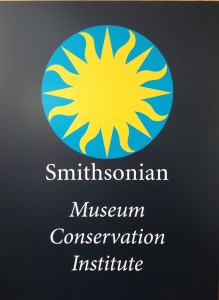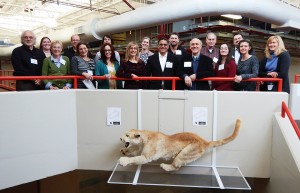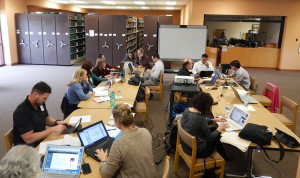Sponsored by the Smithsonian’s Museum Conservation Institute Suitland, MD March 18-20, 2015
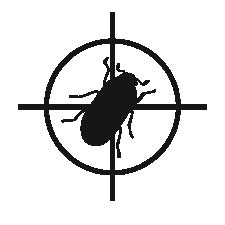 In 2015 the Integrated Pest Management Working Group (IPMWG) will build on the success of 2014’s conference MuseumPests 2014: Integrated Pest Management for museums, libraries, archives and historic sites by offering an expanded program with the generous support of the Smithsonian Institution’s Museum Conservation Institute in Suitland, MD.
In 2015 the Integrated Pest Management Working Group (IPMWG) will build on the success of 2014’s conference MuseumPests 2014: Integrated Pest Management for museums, libraries, archives and historic sites by offering an expanded program with the generous support of the Smithsonian Institution’s Museum Conservation Institute in Suitland, MD.
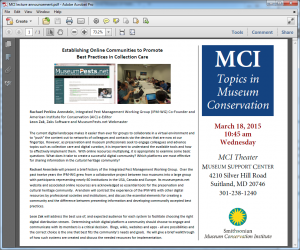 The three day program will begin March 18 with a morning lecture. Speakers Rachael Perkins Arenstein, Co-Founder and Co-Chair of the IPM-WG and Leon Zak, Zaks Software and MuseumPests.net webmaster will talk about Establishing Online Communities to Promote Best Practices in Collection Care. Using the history of the IPM-WG as an example, the lecture will focus on the development of online platforms and tools to support the dissemination of best practices information developed by grass-root communities. The current digital landscape and future trends make digital dissemination efficient and easy for groups. Understanding the tools and how to effectively implement them opens opportunities for other groups focusing on collection care to effectively expand access to best practices for the benefit of all cultural holdings.
The three day program will begin March 18 with a morning lecture. Speakers Rachael Perkins Arenstein, Co-Founder and Co-Chair of the IPM-WG and Leon Zak, Zaks Software and MuseumPests.net webmaster will talk about Establishing Online Communities to Promote Best Practices in Collection Care. Using the history of the IPM-WG as an example, the lecture will focus on the development of online platforms and tools to support the dissemination of best practices information developed by grass-root communities. The current digital landscape and future trends make digital dissemination efficient and easy for groups. Understanding the tools and how to effectively implement them opens opportunities for other groups focusing on collection care to effectively expand access to best practices for the benefit of all cultural holdings.
Following a networking lunch for IPM-WG and SI participants, Smithsonian staff will lead tours of various IPM related facilities across the Suitland Museum Support Center (MSC) campus. Tour topics will include a selection of the following:
- National Museum of Natural History, Department of Anthropology – Low temperature treatments & Historic pesticide policies
- National Museum of Natural History, Department of Vertebrate Zoology – CO2 treatments
- National Museum of Natural History, Botany Department – Predatory bacillus & pest control operator licensing
- Horticulture, Greenhouses – Commercial operations & licensing of pest control operators
- National Museum of Natural History – Storage design and current pesticide policies
- Osteoprep Lab – Larder beetle colony for defleshing mammals
- National Museum of the American Indian – Low temperature treatments, trapping and historic pesticide use
- Museum Conservation Institute – Argon anoxic treatments
- Museum Support Center Pod Storage – Trapping & PDB contamination
The subsequent two days (March 19-20) will be a return to the IPMWG format focusing on further development of the online content for museumpests.net
The three-day program is by invitation only as space is limited. To request a spot please RSVP for the program by emailing thechair@museumpests.net please include IPM-WG 2015 meeting in the subject line. Your request must include name, address (company/institution), phone # & email address. RSVP’s will be accepted through March 9. Priority will be given to returning participants on a first come, first serve basis and to new participants who are actively involved in an IPM program in their institution.

